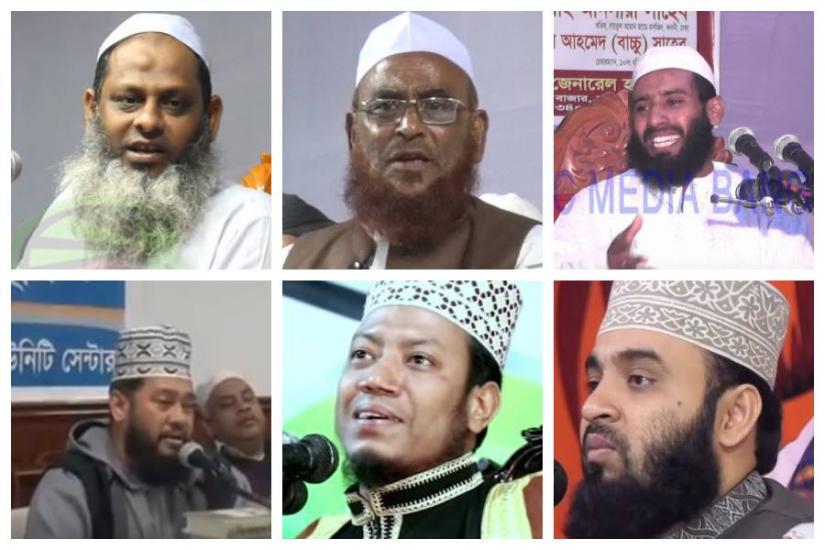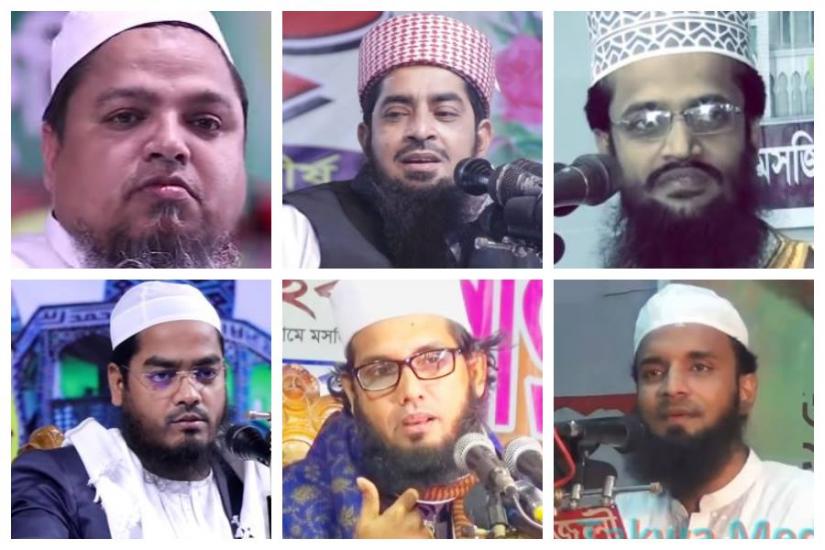 Waaz Mehfils have been a part of Bangladesh for as long as one can remember. A predominantly Muslim country, these calls “spreading the virtues of Islam” are still quite popular in the country.
Waaz Mehfils have been a part of Bangladesh for as long as one can remember. A predominantly Muslim country, these calls “spreading the virtues of Islam” are still quite popular in the country.
Despite being a religious affair, even Waaz Mehfils have not been able to escape the touch of technology and modernity. Over the years these programs, have undergone a drastic make-over in terms of both the spirit and structure, especially after the 1971 War of Liberation, say people familiar with the matter.
Senior scholars say that after 1975, Waaz Mehfils have “changed.” The touch of modernity has given way for many speakers to earn money from these sermons; something that wasn’t the norm in the olden days.
There are speakers who openly enlight audiences about their assets and then there are some who use the money to run Madrasas.
These religious sermons which have become big events in themselves have also created a way for decorator and mike rental businesses. Not only that, in the tech-savvy generation, well known speakers have their sermons recorded and upload it on online platforms so that the followers can listen at their own leisure. Considering that these Mehfils are not seasonal, those in the video-making trade have no difficulty making a steady cash-flow.
An artist group of sorts comprising of Kawmi Madrasa students have also formed surrounding these Mehfils where they perform “religious songs” in exchange for a little “honorarium.”
Although scholars agree that the socio-economic influence of these Mehfils are quite widespread they are split when it comes to whether they have become commercial.
Organizers and speakers say that these gatherings usually start in October and continue for six months till March-April.
Religious bodies like Kawmi and Aliya Madrasas, mosque committees and youth bodies are usually the organizers.
 However, the pro-Chormonai Mujahid Committee ensure make sure that Mehfils are organized throughout the whole year.
However, the pro-Chormonai Mujahid Committee ensure make sure that Mehfils are organized throughout the whole year.
“Rain or sunshine Chormonai’s Mehfils take place throughout the year. They’re not seasonal, said religious political party Islami Andolan’s Office Secretary Mowlana Ahmed Abdul Qayum.
In the last 50 years these gatherings have become more decorative, with the stages full of lights and bling and musical programs which some scholars think is making the methodology of spreading religion questionable.
There are around 80-100 pro-Qawmi madrasa speakers who preach Islam during these mehfils. As a matter of fact some have such popularity in YouTube, they are invited to speak in the other end of the country. There are speakers who preach in as many as 10 gatherings a day!
In pursuit of “honorarium?”
A little digging regarding the fees the speakers charge revealed a wide array of information which has been verified solely based on the speakers and organizers had to say.
The scholars, however, are split on whether the entire Waaz Mehfil affair has been commercialized. Many see negotiating prices as unacceptable while many see it as inevitable.
The speakers say that they accept whatever the organizers pay them but some scholars say that there is a group of speakers who do negotiate prices before undertaking the lofty task of inviting people to the path of righteousness.
However, pro-Chormonai speaker Mowlana Shamsul Hoque doesn’t make a secret out if it and openly tells his audience that he charges Tk 30,000 to speak at a gathering.
Many say that they do charge but only do so because they have families to look after and to pay for the expenses.
At least five scholars who are involved with the organization of such programs told Bangla Tribune that a pro-Jamaat speaker charges as much as Tk 100,000!
They say that this person used to charge Tk 30,000-Tk 40,000 only a few years ago.
They said that a leader belonging to a political party of the BNP led 20-party-alliance names prices for making an appearance in the programs.
Then again there is a religious speaker at Bhoirob who allocates as much time as he is paid.
One speaker Mowlana Mazharul Islam Mazhari during a sermon told his audience that he now the owner of cars, homes and money although he paid for his studies by selling eggs. The video of his confession, however, has been removed.
In January of 2019, Mowlana Shamsul Hoque said that it dosen’t take long for Waaz Mehfil speakers to make assets. He openly admits to charging Tk 30,000 per program.
“I take it because I need it to run the madrasa,” he said and added that he could buy materialistic things with the money these programs bring but chooses to spend it on the madrasa.
Meanwhile, Mowlana Habibur Rahman Juktibadi refuses to see speaking at Waaz Mehfils as commercial or a professional.
“It’s not right to take on speaking at Waaz Mehfils as a profession,” Habibur who started preaching right after Independence told Bangla Tribune.
He added that the sole purpose has to be calling people to the path o f Islam.
“I’ve been speaking at programs since Independence but never made any deals. I don’t understand these things but I hear there are people who charge for it,” he said.
Several scholars on the other hand say that many speakers who weren’t financially well-off have become solvent due thanks to these gatherings.
Mowlana Manjurul Islam Afendi heads the Kawmi Madras in Old Dhaka’s Lalbagh and has been speaking at such gatherings for the last 20 years.
“It’s totally wrong to make deals before joining a gathering,” he told Bangla Tribune.
He added that there isn’t any scope to see it as a profession and he happily accepts whatever the organizers pay him.
“By the grace of the Almighty I’m financially able and live well with my family,” he said, adding that he has receives anywhere between Tk 7,000 to Tk 25,000 to speak at a Waz Mehfil.
Manjurul said that many a times organizers arrange for him to be flown to other parts of the country to speak and bear the expenses.
What do scholars say?
Young writer Mowlana Salauddin Jahangir is of the view that several speakers have risen to the top of the mehfil speaker chain not because they preach the virtues of religion but becase their videos on YouTube that have gone viral are often a source of entertainment or comic relief.
“No one thinks that these are religious sermons. They listen to it for entertainement,” he told Bangle Tribune.
He said that they became “speakers” despite that and they now “charge Tk 30,000-40,000 per sermon whereas they used to charge Tk 10,000-15,0000 before.”
Jamiya Arabia Darul Ulum teacher Mowlana Wali Ullah Arman thinks that many young scholars are now drawn to “fame” given the easy access to social media platforms like Facebook or YouTube where things go viral in the blink of an eye.
“Those who have a good voice become speakers and the organizers pay them good money,” Arman said and added that there is a chance some might see this as a source of income in addition to fame.
“But it can’t be said for sure whether they take it on as a profession to make a living,” he said.
“It’s not like those who are responsible for the gatherings are fully aware of the spirit of Islam.
“Hence it can’t be expected to make informed decisions on what sort of speakers to invite,” he added.
Arman said that many use the money they earned to support religious institutions as well as stand beside those in need.
Former Islamic Foundtion director Mowlana Fariduddin Masud says that there is a huge difference in the nature of Waaz Mehfils then and now and that it started changing since the partition of 1947 and started losing gravity right after 1971.
“After the ninetees, Waaz Mehfils became commercial and it has morphed into something bigger,” he told Bangla Tribune.
He said that back in the day those who used to preach had both knowledge and piety and practiced the religion.
Jamiya Rahmania Arabia chief Mufti Mowlana Mansurul Hoque touched on a few ruled for the organizers of these gatherings.
He said that the jobs of the speakers is to invite people to the path of Islam and those that don’t charge money should be given first priority.
He added that calling people to religious path was something that the prophets did and they didn’t charge for it.
Former lawmaker and United Muslim Ummah president MA Awal who is involved with the organization of such religious gatherings said that a class of preachers have made a business out of the whole thing.
“They have taken it on as a profession. They negotiate prices and take advance for bookings,” he told Bangla Tribune.
He said that it doesn’t matter which sect they belong to, they all charge advance money because they are in demand.
“I don’t want to name anyone. This will create unncesessry confusion,” he added.
Preaching in the digital era
For quite some time now, Waaz Mehfils have been a steady source of income for megaphone rentals companies and decorators as well as video makers.
The rent of each megaphone is Tk 600-700 in Dhaka and in each programs as many as 30 of those are used.
Decorators on the other hand set up marquees and colourful lights usually come with the package and the number of megaphone depends on how big the marquee is.
However, megaphone rental owners say that this time business was on the downside given the national polls.
“We didn’t make much profit this year,” said Abdul Kalam Azad, the owner of ‘Raj Mic’ in the capital’s Komolapur.
He added that gatherings didn’t take place much due to the polls.
The rural areas can give Dhaka a run for its money when it comes to the extravagance of these events.
Shah Alam has been in the decorating business for over two decades in the north-eastern district of Habiganj.
“The number of Waaz Mehfils have increased in our region and the marquee charges depend on the nature of the programs,” said Alam who lives in Madhabpur Upazila.
Saying that the charges include labour, lights and various other things he added that they billed Tk 19,000 recently in one of the unions.
“Sheikh-e-Baruna and Tulapara Huzur are in high demand here in our region,” Alam said and added that they don’t charge money and accept whatever the organizers provide.
“There are some who charge Tk 20,000-25,000 and you have to book them in advance upon a deposit,” he said.
In the last few years, many speakers who gleaned popularity through the videos they uploaded in YouTube.
People involved in the trade of video making said that there are more than 500 organistions who specialize in shooting and editing Waaz Mehfil videos.
They charge depending on the venue and speaker, people familiar with the matter say.
Ibrahim Hossain, who runs the YouTube channel ‘Mohammadia Islamic Media’, says that they receive calls of making videos of such gatherings from both the organisers and speakers.
He has recorded around neary 4,000 videos of Waaz Mehfils till March and charges around Tk 3,500 per video and has 10 people working under him.
“Everyone looks for the speakers on YouTube hence they themselves pay to have these made,” he said.
He added that these speakers “call people to the path of religion” through these videos as many don’t have the time to listen to those in person.
Another such person is YouTube channel owner Banglawaj TV who charged Tk 3,500 per video and also delivers in them in the form of CDs.
Preaching with a touch of music
Back in the day Quran recitations and religious hyms used to be presented during these gatherings.
Nowdays, a group of “Islamic artists” perform music before and after the Waaz Mehfil and they charge for it as well.
One member of such a group said that they charge Tk 40,000 for every two hours of musical show.
He added that they are a group of 13 and in the beginning they used to accept whatever the organizers gave but with increasing expenses they now have a fixed rate.
“Many children learn Islamic music in the Kalarob artist group” groups Assistant Director Mowlana Ilias Hassan told Bangla Tribune.
He added that they have many expenses including the education of those children but they charge based on the distance and location of the venue.


